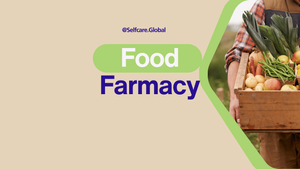The Power of Food Lies Far Beyond Its Nutrients
Think back to the last meal you enjoyed. Beyond its taste, that food is currently working its way through your body, influencing your genetic expression, rebuilding your cells, and even determining how you'll feel hours from now. What if I told you that these everyday choices—these seemingly mundane decisions about what goes on your plate—are actually the most powerful medicine you'll ever take?
I discovered this truth the hard way. After years treating thousands of patients in both clinical and performance settings, I watched countless people struggle with fundamental health issues while simultaneously pursuing expensive, complex treatments. The disconnect was striking—they were trying to heal while three times daily consuming foods that worked directly against their recovery.
The truth is beautifully simple yet profoundly life-changing: food is not just fuel, it's information. Every bite programs your cells, shifts your microbiome, and even influences which genes get expressed or silenced. This isn't just nutrition—it's transformation at the most fundamental level.
The 3 Major Challenges We're Here to Solve Together
- The Confusion Challenge: In a world with contradictory nutrition advice everywhere you turn, how do you discern which approach is truly right for your unique body? We'll cut through the noise with science-backed clarity.
- The Convenience Challenge: When life gets busy, how do you make food choices that heal rather than harm without spending hours in the kitchen? We'll explore practical implementation that fits real life.
- The Connection Challenge: How do you shift from seeing food as merely calories or macros to recognizing it as medicine, information, and even connection? We'll transform your relationship with eating at its core.
Would you be open to joining a community where we explore these challenges together, sharing both wisdom and practical approaches? Our SelfCare Community is where transformation happens through connection.
The SelfCare Framework: Learn-Do-Embody-Teach
The journey to making food your medicine follows our core framework:
1. LEARN: Understanding the science behind food as information
When you eat, you're not just consuming calories—you're delivering molecular messages that trigger cascading effects throughout your body. Research from the emerging field of nutrigenomics shows that bioactive compounds in food directly influence which genes get expressed or silenced.
May I share something that changed everything for me? When I discovered that phytonutrients in colorful vegetables don't just provide vitamins—they actually trigger cellular defense mechanisms that strengthen your entire system, I realized that every meal is a chance to upgrade your body's operating system.
The research is clear: studies from the Harvard School of Public Health demonstrate that shifting dietary patterns can reduce inflammation markers by up to 40% in just three weeks. This isn't just about prevention—it's about actively creating health with each bite.
2. DO: Simple implementation that transforms your plate and life
What if transforming your health could begin with just one meal? The power of small, consistent shifts compounds over time.
Try this simple approach that I've seen transform thousands of lives:
- Add Before Subtracting: Rather than focusing on what to eliminate, simply add one additional serving of colorful vegetables to your next meal. This single shift begins crowding out less beneficial options naturally.
- The 3-Day Reset: For just three days, remove all processed foods and observe how differently your body feels. This isn't about forever—it's about creating a clear baseline to recognize how foods affect you uniquely.
- Eat Like Your Ancestors: Consider that for thousands of generations, your ancestors thrived without packaged foods. When possible, choose foods that would be recognizable to someone from 100 years ago.
Would you be curious to discover more implementation strategies specifically designed for your lifestyle and challenges? Our SelfCare Book dives deeper into customized approaches based on your individual situation.
3. EMBODY: Moving from "dieting" to becoming someone who naturally thrives
The most powerful transformation happens when food choices shift from being something you do to being a reflection of who you are.
Remember: Your body replaces billions of cells every day. The building materials for these new cells come directly from what you eat. With each meal, you're literally reconstructing yourself molecule by molecule.
This perspective transforms the question from "What should I eat?" to "Who am I becoming with these choices?" When you embody this understanding, food selection becomes an expression of self-respect rather than a struggle with willpower.
4. TEACH: Creating ripples that extend beyond your own plate
Once you've experienced the transformation that comes when food becomes medicine, you naturally become a living example for others. Without preaching or pushing, your visible vitality sparks curiosity.
Many community members share that their children, partners, and colleagues begin making similar shifts simply through proximity to someone who radiates wellbeing. This creates a ripple effect where your personal choices silently inspire those around you.
Your Next Step: From Information to Transformation
The science is clear—food is either working for or against your health with every bite. But information alone rarely creates transformation. The magic happens when knowledge meets community and practical implementation.
If you're ready to explore how food can become your daily medicine in a way that's both scientifically sound and practically doable, I'd like to invite you to two places where this journey continues:
- Join our SelfCare Community where we're exploring these principles together in a spirit of shared discovery.
- Dive deeper with the SelfCare Book where we unpack the full science behind food as medicine, along with practical implementation pathways for your unique situation.
Remember: In a world obsessed with complexity, true healing often begins with the most fundamental choices—like what goes on your plate three times each day.
Key Research References:
- Minich, D. M., & Bland, J. S. (2023). Personalized Lifestyle Medicine approach to food as medicine. Journal of Personalized Medicine, 13(1), 97.
- Harvard T.H. Chan School of Public Health. (2023). The Nutrition Source: Food as Medicine. Retrieved from https://www.hsph.harvard.edu/nutritionsource/food-as-medicine/
- Bland, J. (2022). Food as information: How nutritional signals regulate human cellular function. Alternative Therapies in Health and Medicine, 28(S1), 30-37.
REFERENCES
This is directly referenced from the Amazon best-selling SelfCare Book "Lifestyle Medicine For the People" by Rory Callaghan. If you would like to read more content like this, grab the free online chapters of the book or a hard copy.
We have done our best to reference everyone's expert opinions, peer-reviewed science, and original thoughts, all references available here and referenced in the text.
We also understand that most thoughts are not our own and there is a collective unconsciousness, unconsciousness, and universal mind stream of energy that is always at work. How our references are sorted and filtered is here.
This article is for informational purposes only and should not replace professional medical advice. Always consult with your healthcare provider before beginning any new health regimen.




